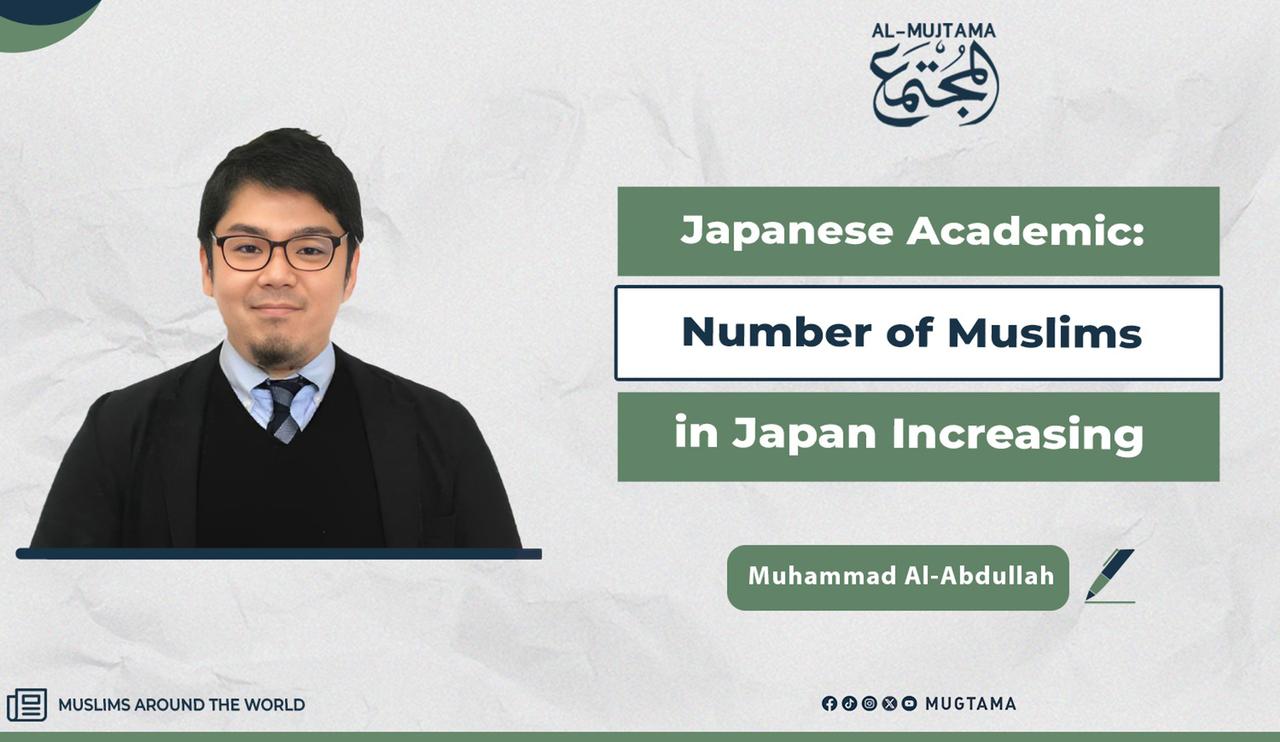Japanese Academic: Number of Muslims in Japan Increasing

Muhammad Al-Abdullah
When Japan is
mentioned, it evokes the world of robotics and artificial intelligence across all aspects of life, as it is considered the second-largest market for industrial robots globally, after China. According to recent statistics, 435,299 industrial robots are operating in Japanese factories, largely used to
compensate for the shortage of labor in all sectors, including services and
healthcare.
Few people know much about the situation of Muslims in
Japan, or how Islam
first entered the country. It was brought by the journalist Osotara Noda,
known as Abd al-Haleem Effendi—a correspondent for the Beiji Shimbun
newspaper—in 1891. He converted to Islam after a debate with the head of the
Muslims in Liverpool, Abdullah
Quilliam Effendi.
Al-Mujtama magazine
contacted Akifumi
Nomura, an associate professor at Takushoku University, to
learn more about the situation of Muslims there, who represent a minority in
the country, constituting about 1% of the total population of over 130 million.
Q: Few people know anything about the situation of Muslims in Japan. Can you tell us about it up close?
A: There are no accurate official statistics, but estimates suggest there are about 200,000 Muslims across the country, and the number is increasing year after year. The primary reason for this is the growing number of conversions to Islam due to marriage.In Japanese society, housing is in most cases determined by the nature of one's job. Therefore, there are no residential areas exclusively inhabited by Japanese Muslims. Consequently, Muslims live scattered throughout the country. The number of second and third-generation Muslims is currently increasing. Among them, a small percentage are children of Japanese converts, but the majority are children born into families of foreign Muslims.
With the reality of the increasing number of Muslims and the rising number of foreign tourist visitors in recent years, many people from Muslim countries are visiting Japan. In response to these needs, prayer spaces have been established in department stores, airports, and other locations. The number of Halal-compliant restaurants has also rapidly increased in major urban areas.
Q: What is the main reason for the annual increase in the number of converts to Islam?
A: Fortunately, the number of Muslims in Japan is gradually increasing. The main reason is marriage. However, there are also those who learn about Islam through human interaction, become interested, and then convert. This means that acceptance of Islam often does not happen through direct Da'wah conducted by religious scholars and figures.Japan's policy after World War II did not actively seek to integrate religion itself into public institutions or education. Although there was an aspect of formal religious character taught within compulsory education, it was replaced by teaching ethics and values.
Due to Japan's rapid economic growth and development, many people lost the meaning and purpose of life, and it became difficult to find tranquility in times of hardship. Into this spiritual vacuum, deviant groups or individuals emerged who exploited people's religious needs for personal gain and material profit, severely damaging the image of religion in Japan. This resulted in a strong perception in Japan that religion means "brainwashing and a deviant cult."
In fact, it can be said that many new converts do not come through direct Da'wah by religious studies specialists, but rather through pleasant interactions with the general public, which spontaneously lead to interests in Arab or Indonesian culture, and in the process, they discover Islam.
Q: Muslims in Japan are a minority. Do they face any harassment?
A: Muslims are indeed a minority, but if asked: Is there direct harassment in general? The answer is no. Japan does not have a history of direct confrontation with the Islamic world on a religious basis; therefore, it cannot be said that violent conflicts have become a common occurrence.However, since cremation is a common practice in Japan, and Muslims seek to establish a dedicated Muslim cemetery, friction sometimes arises with neighboring residents. Although this is not solely due to religious prejudice, the main reason is a lack of understanding toward diverse cultures.
Q: How is the Arabic language spreading in Japan? And what difficulties do you face?
A: Studies on Islam and the Arabic language are undoubtedly conducted in Japan. However, many Islam specialists have studied it within a Western historical perspective. Therefore, there are gaps between this perspective and the authentic value systems in the Islamic world.It is interesting that when reviewing the literature of Japanese researchers of Islam before World War II, we find a depiction of the Prophet Muhammad (PBUH) as a heroic figure. It appears that Japan found great appeal in the idea that Prophet Muhammad (PBUH) single-handedly founded a massive community, so they were more interested in his achievements as a statesman rather than a religious figure.
Q: The Japanese people are famous for being precise, organized, and innovative. Where do Muslims fit into this system?
A: Due to the small number of Muslims among the Japanese, there isn't a noticeable special relationship between national character and Islam. However, if we look at the general content, common ground can be found, such as the reverence for good manners and respect for rules.Furthermore, Japan enjoys religious freedom, and individuals are not required to disclose their religion. Therefore, in the fields of science, technology, and invention, the religion of the person achieving the feat is not usually highlighted.
Q: What are the supporting and organizing bodies for Muslims in the country?
A: There are organizations such as the Japan Muslim Association, in addition to the establishment of mosques in various parts of Japan, especially in major cities. Local mosques often serve as a reference point for mutual support and community activities.Q: Do Muslims in Japan receive stable support from Arab and Islamic countries?
A: To my knowledge, the UAE and Saudi Arabia provide direct support for activities through Ramadan programs and the like, directed toward the Japan Muslim Association and mosques in various regions.Kuwait, in particular, provided support for the construction of a mosque in Hokkaido, which was built with full funding from the Kuwaiti government.
The interview was conducted by Mohammed Al-Abdullah.
You can also read:
Conference
in Tokyo on Saving Gaza











